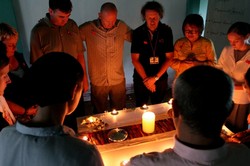Editor’s note: Brett and Shelly Faucett, members of St. Andrew’s Presbyterian Church in Newport Beach, Calif., were sent to Chiang Mai, Thailand, in August 2007 as part of the Mission Initiative: Joining Hearts and Hands campaign of the Presbyterian Church (U.S.A.). Though the Joining Hearts and Hands funding expired at the end of their first term, they continue their service in Northern Thailand. This is the first of two articles about their work.
Brett Faucett, Presbyterian, registered nurse and amateur photographer, is more comfortable being behind the scenes than the point of focus. It was that type of behind-the-scenes role that he initially sought out in his ministry as a mission co-worker with the Church of Christ in Thailand’s AIDS Ministry (CAM).
“At the beginning I focused more on helping the staff with their English correspondence, report writing and overall documentation of the work that they are doing, both with photography and with video,” Faucett said. He also built and maintained the organization’s website and updated its blogs.
“When I was made aware of a facilitators training seminar on HIV and AIDS, called Channels of Hope, that was being held down in Bangkok, I was encouraged by the CAM staff to attend it,” said Faucett, who was reluctant.
Run by World Vision, Channels of Hope trains facilitators to lead three-day HIV and AIDS workshops for religious leaders.
“I attended the training really out of obligation and peer pressure,” Faucett said. “I liked being more behind the scenes — not the one out there doing the facilitating.”
But he went — and was transformed by the experience.
“When I went through the facilitators training course I was forced to think over the tough questions that we ask our participants when leading the workshop — I had to question what do I really believe, and how do I live my life and follow those beliefs?” Faucett said.
The workshops focus on religious leaders, who have a significant influence not only in their congregations, but also in the community. It is often within the church that those living with HIV and AIDS encounter some of the worst stigma and discrimination.
“I’ve seen people going from being inadvertently judgmental to having compassion and understanding for those living with HIV,” said Faucett. “It is beautiful and touching to see that transformation.”
One of the key components of Channels of Hope, according to Faucett, is moving participants away from an ‘us and them’ mentality toward a mentality of ‘us.’
“We are all part of the problem, and we are all part of the solution,” he said.
Throughout the course, participants are involved in role play, confidential questionnaires and other activities designed to coax out conversation about what can be very delicate subjects — AIDS, sexuality and the Christian faith.
“We tell the participants on the first day that we are going to be talking about very uncomfortable topics and that their ideas will be challenged,” Faucett said.
Participating in the training and now facilitating it himself has brought a shift in Faucett’s understanding, challenging him to be more aware of how he speaks of those living with HIV.
“It really challenged me in how I wanted to be treated but was not willing to treat others,” he said.
One particular activity brought this point home. In it, three questions are asked, and participants are urged to write down their immediate, honest, gut reaction.
“In the first situation, a man comes up to you at the mall and taps you on the shoulder and says, ‘I have AIDS.’ My reaction was, “Why are you telling me? I’m sorry,” Faucett said.
In the second situation it is one’s partner who makes the statement to the participant, and in the third situation it is the participant that is in the position of having to confess this information to their partner.
“What I realized, in going through this, was how ashamed I was and embarrassed that I didn’t treat my loved one the way I wanted to be treated,” Faucett said.
His hope is that others, especially church leaders, can experience a similar transformation through this training.
“I hope that the church community can see that HIV is a symptom of broken relationships and that they can be instrumental in building up those relationships with love and understanding — and less judging,” Faucett said. “I hope that we, as a community, can love our neighbor as ourselves — even if that neighbor has HIV.”
To make a donation to the Faucetts’ work in Chiang Mai, visit Interserve and indicate ‘Faucett Family’ under partner support.
Erin Dunigan is a freelance writer, photographer, and pastor who lives in a small coastal community in Baja California, Mexico when she is not following her wanderlust out into the world.

